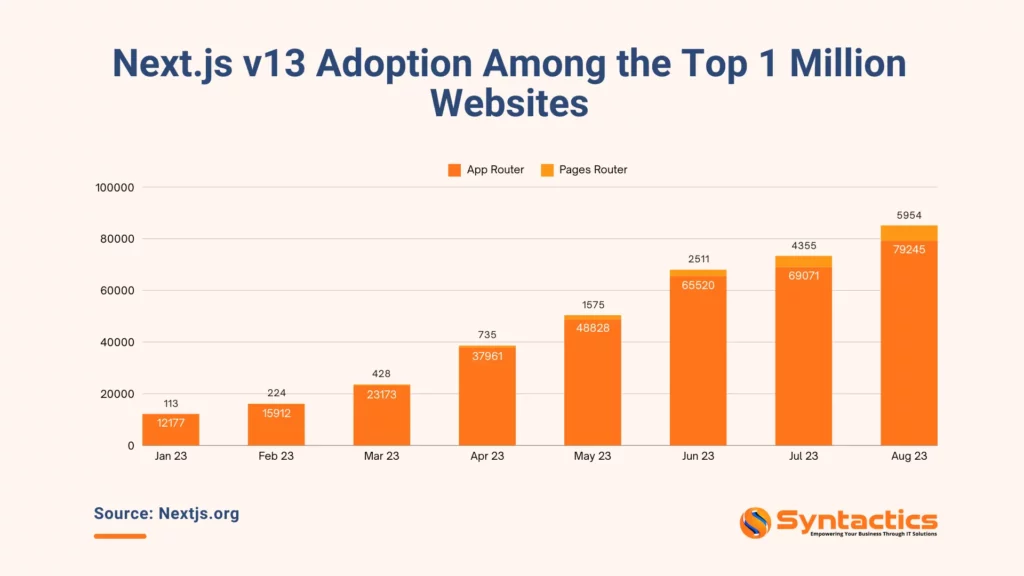
9 Key Next.js Developer Skills You Need in Your Team
Building efficient, scalable, and high-performance projects often requires businesses to rely on teams of web developers with diverse skill sets. For modern projects, a skilled developer can maximize the Next.js framework’s potential and deliver outstanding results.
Next.js is a leading framework for web development, thanks to its powerful features and seamless integration with ReactJS. It enables developers to create scalable and dynamic end-products that stand out in today’s competitive digital landscape.

Source: Stack Overflow.
A team that’s equipped with key skills like proficiency in ReactJS and performance optimization can deliver user-friendly websites and web applications that engage users while driving business success.
9 Key Next.js Developer Skills You Need in Your Team
To guarantee development project success, here are the top skills to look for in a Next.js developer:
1. Proficiency in ReactJS
Mastering the ReactJS front-end library is a crucial skill for developers, especially since it’s the foundation for Next.js.
Experienced developers with a mastery of the tool can leverage its core concepts — such as hooks, context, and lifecycle methods — to ensure seamless Next.js integration, maximizing its potential.
For instance, Next.js developers can utilize component-based architecture to craft efficient, reusable components for a streamlined development process.
Their familiarity with tools like Redux or the Context API also enables effective state management, which is vital for handling complex projects.
As such, developers can build scalable, high-performance Next.js websites and web applications that meet the demands of modern users.
2. Mastery of Server-Side Rendering and Static Site Generation
A skilled developer possesses a deep understanding of Server-Side Rendering (SSR) and Static Site Generation (SSG), which are essential in developing web projects.
SSR enhances project load times and ensures that search engine crawlers can easily access website content. On the other hand, SSG pre-renders static pages, improving performance and scalability.
These approaches can even be combined along client-side rendering to create dynamic, high-performing websites or web apps.
A strong command of both SSR and SSG is crucial for optimizing project performance and boosting SEO. This way, a developer can deliver faster-loading, user-friendly web products that provide an exceptional experience.
3. A Deep Understanding of API Routes and Data Fetching
Next.js simplifies the process of creating Application Programming Interface (API) endpoints and data fetching, making it a powerful tool for modern web development.

Source: Nextjs.org.
With in-depth knowledge of API routes, developers can build secure, serverless functions within the Next.js framework. There are two types of routers in Next.js — App Router and Page Router.
Through the App Router, developers can utilize Server Components and Streaming features. It’s designed for improved flexibility and performance, perfect for more complex client-side projects.
On the other hand, the Pages Router enables developers to build server-rendered React applications. With features like client- or server-side rendering options and API route support, it’s ideal for smaller projects that don’t require advanced features.
Next.js professionals can leverage data fetching methods for various use cases, including:
- getStaticProps;
- getServerSideProps, and
- getInitialProps.
In addition, Next.js enhances performance through optimization, effectively handles asynchronous data, and ensures a seamless flow of information.
4. Expertise in Performance Optimization
Performance optimization is critical for any successful website or web application, as it directly impacts user satisfaction and SEO rankings.
A senior developer excels at optimizing performance by optimizing assets, minimizing bundle sizes, and implementing strategies like lazy loading and code splitting. The latter two allow experts to dynamically import components, leading to reduced initial load times.
Developers can also deliver responsive, high-quality images by way of Next.js’s built-in tools, enhancing both speed and UX.
To further refine performance, they often use tools like Lighthouse and NextJS analytics to assist with identifying bottlenecks and fine-tuning the project for optimal speed and efficiency.
5. In-Depth Knowledge of SEO Best Practices
In today’s digital world, maintaining visibility amidst countless websites and apps can be a challenge. As such, achieving online success requires a strong focus on SEO best practices.
Web app development professionals can harness the power of Next.js’ meta tag management and sitemap generation features to enhance SEO performance.
Of course, developers can leverage SSR and SSG to significantly improve indexability, boosting visibility and search engine rankings.
Moreover, they can use Next.js’s built-in tools to optimize metadata and implement structured data for better visibility. Additionally, they can improve the website or web app’s Core Web Vitals, further improving overall performance and user experience.
6. Familiarity with Static and Dynamic Routing
Routing plays a crucial role in web development, and Next.js simplifies the process with its intuitive file-based routing system.
Expert developers can effortlessly implement static, nested, and dynamic routes to meet diverse application needs, ensuring smooth and user-friendly navigation.
For example, in error handling, a seasoned website developer can implement custom 404 and error pages to improve UX. Also, they can build dynamic routes to manage user- or content-specific paths with precision and flexibility.
7. Version Control and Collaboration Tools
Collaboration is a vital skill for developers, especially those working within dedicated teams, to deliver successful projects.
To foster effective teamwork, streamline code reviews, and ensure smooth integration, experienced developers rely on systems like Git for version control. In particular, Git is a powerful tool that manages code and facilitates seamless cross-team collaboration.
Seasoned developers are knowledgeable about Continuous Integration/Continuous Delivery (CI/CD) pipelines, enabling them to automate builds and deployments for faster, more efficient iteration cycles.
In addition, familiarity with tools such as GitHub, Bitbucket, and GitLab further enhances project management and communication.
8. Security Best Practices
Websites and web applications face an ever-growing risk of security breaches, with Apple reporting a record high of breaches in 2023.
Fortunately, secure Next.js development can protect both end-users and your business from malicious hackers and potential legal consequences.

Source: Apple.
To achieve this, Next.js developers implement robust web security measures to safeguard websites and web apps from common threats. Key examples include:
- Authentication and secure login systems;
- Secure Application Programming Interface (API) routes;
- Vulnerability protection to prevent Cross-Site Scripting (XSS) and Cross-Site Request Forgery (CSRF);
- Content Security Policies (CSP);
- Hypertext Transfer Protocol Secure (HTTPS) enforcement, and
- Environment variable management.
9. Cloud and Serverless Deployments
In addition to development skills, a professional web developer possesses the deployment expertise necessary for creating scalable and reliable applications. They’re well-versed in serverless deployment platforms, such as Vercel, AWS Lambda, and Netlify.
Developers can also leverage containerization tools such as Docker to maintain consistency between development and production environments.
Additionally, their knowledge of CI/CD pipelines allows for faster and more reliable updates to live environments. This approach enables them to streamline the development process further, boosting overall project efficiency.
Conclusion
Choosing the right Next.js developers for your team requires a careful evaluation of their technical proficiency and strategic thinking. Developers with the following skills can drive project success while keeping your business ahead of the competition:
- Proficiency in ReactJS
- Mastery of Server-Side Rendering (SSR) and Static Site Generation (SSG)
- A deep understanding of API routes and data fetching
- Expertise in performance optimization
- Strong knowledge of SEO best practices
- Familiarity with static and dynamic routing
- Version control and collaboration tools
- Security best practices
- Cloud and serverless deployments
Developers who possess these nine key skills can help your organization harness the full power of NextJS to deliver efficient, scalable, and high-performance websites and web applications.
Frequently Asked Questions About Next.js Development
Is Next.js a coding language?
No, Next.js is not a coding language. Rather, it’s a React-based framework for building websites and web applications.
What is Next.js used for?
Next.js is used for the following:
- Building dynamic websites;
- Generating static website pages;
- Creating SEO-friendly applications;
- API development;
- Building eCommerce websites, blogs, dashboards, etc.
Are Next.js developers in demand?
Yes, Next.js developers are in demand — and highly so. With more businesses prioritizing performance, SEO, and scalability, Next.js has become a go-to web development framework.
In particular, Next.js developers are sought-after in industries such as eCommerce website development and Software as a Service (SaaS).
Does React Developer Tools work with Next.js?
Yes, React Developer Tools, a Chrome Developer Tools extension, is fully compatible with Next.js. Developers can use this tool to:
- Inspect and debug React components within Next.js applications;
- Analyze component hierarchies;
- Monitor state and props, and
- Optimize performance for both React and Next.js projects.

















Comment 0